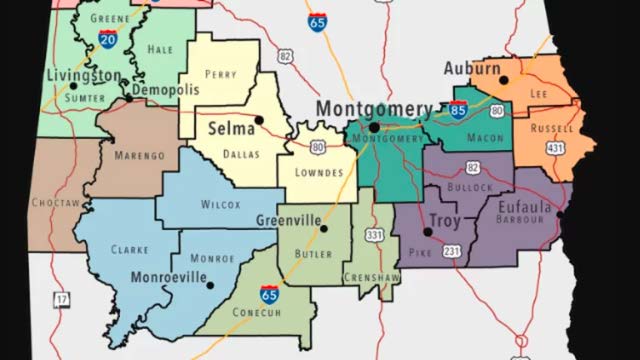‘This project is designed to touch every house in Perry County,” says director
Aaron McCall, director of the South Central Alabama Broadband Commission (SCABC), told Perry County Commission on Tuesday night that his agency wanted to bring fiber internet to Perry County, “within the next three to five years.”
The SCABC has existed since at least 2012 as an agency working to bring broadband internet to parts of rural Alabama, particularly the area surrounding and near to Lowndes County, where it was founded. It was awarded, through its partner at the time, Trillion Communications, a $59 million federal grant to build broadband infrastructure in central Alabama, but that project never got off the ground. The federal agency awarding the grant terminated it in October 2012 with less than 1% of the project complete.
The SCABC restructured after that early setback, however, and in 2014, the Alabama Public Service Commission granted it a Certificate of Public Convenience and Necessity to Provide Telecommunications Services. As a publicprivate partnership, this gave SCABC the status of a public utility serving a particular geographic area in the state, similar to the way local electrical cooperatives have designated coverage territories.
SCABC’s website lists its service area as Lowndes, Macon, Wilcox, Dallas, Montgomery, Monroe, Marengo, and Bullock Counties, with other counties including Perry listed as coming soon.
McCall was in Perry County on Tuesday to ask the county commission to sign on as a member of the SCABC’s corporate district, as well as to grant the agency right-of-way along the county’s roads for the installation of fiber cable. He said the speeds offered would be 100 mbps for both uploads and downloads.
McCall said he had met with Perry County’s Broadband Task Force several times to share information about the proposed project with them. McCall said that the project could also mean revenue for the county if it elects to join the SCABC’s corporate district, in the form of a share of the fees paid by subscribers for service.
“You’re talking about actually laying fiber on the county right-of-way, and then we would profit once people tap into it?” said Commissioner Cedric Hudson.
“Yes,” said McCall. “Once people start subscribing to it, whatever profits are made from that…a portion of that would come back to the community.”
Asked for a timeline, McCall said, “We’re building in phases. Perry County is in Phase 1.” He predicted service would be available to Perry Countians within three to five years. He said certain roads had already been identified as potential places to start, but he did not have that information with him.
Hudson asked if those roads had been selected by McCall’s group, “Or did somebody in Perry County do it?”
“It was done by the engineers,” McCall said. He said Nokia, which is listed on the SCABC’s website (getwiredalabama.com) as a partner, was the project engineer and would be determining how the infrastructure is installed.
“Would any other company be able to join on?” said Commission Chairman Albert Turner.
McCall said the network is designed to accommodate five voice service providers, five data providers, and five video providers, for up to 15 carriers.
“The only thing you’re asking for is permission to run fiber on our right of way?” said Turner. “We don’t have to pay anything? So this is totally of benefit to the county.”
McCall said the resolution would not obligate the county in any way. “How are we going to connect [to the wider network]?” Turner asked.
McCall said he didn’t have that information with him, but could provide it.
“How deep in the rural areas will this extend?” said Commissioner Brett Harrison.
“The project is designed to touch every house in Perry County,” said Mc- Call.
“That’s a combination of fiber and other services, right?” said Hudson.
“We’re looking at 90- 95% fiber,” said McCall. That would be determined by terrain and conditions.
The other service gaps would be filled in using radio or other wireless technologies, he said.
“You won’t be cutting through any roads, going under?” said Turner.
McCall said the fiber would be laid via “microtrenching,” in a two-inch trench six inches deep. He said they would coordinate with the county engineer so that “there will not be any disruption of traffic.”
Harrison asked to see a copy of the sample resolution McCall had brought for the county to approve.
“I think it’s nothing that would be earth-shattering or dangerous to the county to join a consortium of counties so that we could put fiber in at the proper time—this is three to five years down the road—we want to be in at the ground level.” said Turner. “This is only allowing right-of-way usage at the appropriate time.”
Harrison made a motion to table the matter until the commission’s next meeting so commissioners could look over the information before voting. Commissioner Ben Eaton seconded. The motion carried by unanimous voice vote.
Turner said he would “see if it interferes with another relationship we have” with another potential broadband service provider, referring to the commission’s agreement with e-Footprints to bring wireless broadband to the area. “I don’t see any stumbling block or anything that would cause us any harm.”

